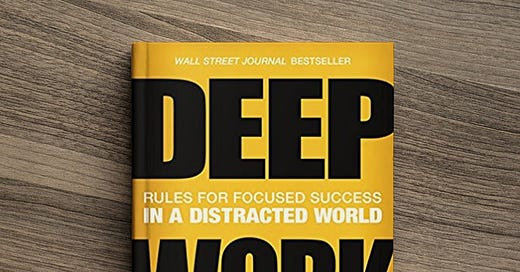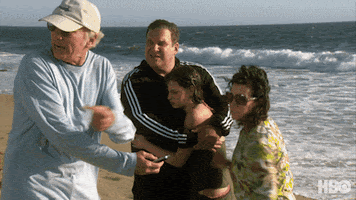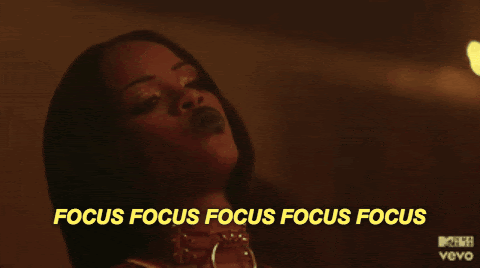Cal Newport’s book Deep Work: Rules for Focused Success in a Distracted World completely changed my writing life when I first read it two years ago. When I reveal this to fellow writers, I’m typically met with a surprised look followed by a curious, “Really?”
That’s because the book is not necessarily about writing, or even about creativity. Newport is a computer scientist who writes about productivity in order to help readers with their work lives. However, I’ve found that the concepts in Deep Work strongly apply to creative work.
Here’s some guidance I’ve taken from Deep Work through the years to help me stay focused while I write.
Get in the zone with a pre-writing ritual.
I like to write in the morning before I start working, so I get ready for my day—walk my dog, shower, and eat breakfast—before my writing time. After breakfast, I fill a big bottle of water, brush my teeth, and prepare my writing space for what Cal Newport calls “going deep.” I close the blinds and set a site blocker on my computer (I use SelfControl) before I even sit down at the desk. Preparing my space this way gets me in the zone for deep work.
Of course, the ritual shouldn’t take so long that you end up avoiding writing entirely. It’s just a way to gently nudge your brain into a state of focus.
Cal Newport recommends turning off your phone entirely while you’re “going deep,” but not everyone has the luxury of being entirely unavailable to the world. Many writers, such as those who have kids or demanding jobs, need to be reachable at all times. Take advantage of the settings in Do Not Disturb mode to allow only the important, necessary calls to get through.
Try putting your phone somewhere out of sight, perhaps in a drawer in the next room. I’ve noticed that I pick up my phone most when it’s out in the open, so if I tuck it away, I find myself longing for it less and less.
Getting in the zone can be harder than staying in the zone.
You’ve made the time to write, set your site blocker, and put your phone away. But what if you still can’t focus?
Whenever I feel my concentration waning, I make a list of specific things I’d like to work on during that day's writing time. There’s no worse feeling than sitting down and not knowing where to begin, so I combat that by listing off scenes I’d like to write, characters I’d like to explore, etc.
That way, if I start on something and get bored or distracted working on one thing, I have other items on my list I can work on instead.
You can also try setting a timer for 15 minutes when you start working to keep yourself on track. When the timer goes off, ask yourself, “Am I working on what I want to be working on?” That way, if you drift away from your doc and into the Anthropologie sale section—we’ve all done it!—you’ll have a reminder to pull yourself back in.
If I still can’t focus or keep getting discouraged while I’m trying to write, I get up from the desk and go for a quick walk. You’ll never solve a problem when you’re clenching your jaw at your desk. Don’t believe me? Take Friedrich Nietzche’s word for it: “It is only ideas gained from walking that have any worth.”
If you want to write for longer chunks of time, build up to it.
A goal of mine this year is to get more accustomed to writing for longer periods of time. Easier said than done, though—it’s no walk in the park to train my brain to focus on my writing longer than it’s used to focusing. What has helped me in starting to add more time to my writing sessions is adding 10- to 15-minute increments at a time, week by week.
Anders Ericsson, inventor of deliberate practice theory, notes in Deep Work that “for a novice, somewhere around an hour a day of intense concentration seems to be a limit, while for experts this number can expand to as many as four hours—but rarely more.” Keep this in mind as you incorporate longer periods of deep work. It is an enormous cognitive challenge to stay focused!
How do you get in the zone (and, more importantly, stay in the zone) while you write?
“Quiet, which is difficult with two toddlers!” —Krystina
“This is a classic example of not practicing what you preach, but eliminating as many distractions as possible. No phones, computers, people, or music. And if I reach a lull in my writing, staring at the page until it passes instead of switching over to something else.” —Julia
“I have a candle I light at my writing desk when I sit down to work on a story, that adds a little sense of romance to my relationship with writing. Lofi playlists, app restrictions, and stopping when I start to get mean to myself about writing all help a lot too.” —Mara
“For me, writing poetry is a little like surfing. Some days the waves are impressive, and some days it's dead calm. I can't control that, and so I don't try, reasoning that everything I do that isn't writing feeds my writing.” —Michael
I’d love to hear about your writing life. Answer my reader questionnaire and I may include your response in future issues of the newsletter! If you’ve provided your answers in the past, I’d love to have you back to answer the new ones I’ve added.
Really Digging This
Here’s what I’ve been reading and loving lately.
Big Friendship: How We Keep Each Other Close — I’ve been a fan of the Call Your Girlfriend podcast for years, but admittedly, I wasn’t so eager to read the book that hosts Aminatou Sow and Ann Friedman released last year. I guess I thought it was going to be yet another dual memoir by a podcasting pair, kind of like the one by the My Favorite Murder ladies.
I’m so glad I finally got around to reading it, though, and can’t fully express how much this book exceeded my expectations. Sure, it’s a book about Sow and Friedman’s friendship, but that’s just the framework. I’ve never read such nuanced, considered thoughts on friendship before and wholeheartedly recommend this book to anyone who’s ever wondered why our society doesn’t seem to value friendship nearly as much as it values romantic and business relationships.
Do It for Yourself: A Motivational Journal— I’ve enjoyed slowly working through Kara Cutruzzula’s guided journal, which was released last year. Paired with @subliming.jpg’s iconic designs, the prompts in this book have helped me consider more authentically why I write and how I’d like that to manifest in my life. I’ve never been so impressed by a guided journal!
Tell me about your lonely victories.
“Finally learned to use Scrivener so I could import a long project in there and see it more clearly.” —Caitlin
“I started using The Artist’s Way and am writing more consistently and feeling unblocked!” —Kalee
I want to hear about your writing achievements, too! Answer my reader questionnaire and I may include your response in future issues of the newsletter.
Lonely Victories is a labor of love. You can support my work by shopping my Bookshop.org affiliate page or tipping me for coffee.
Special thanks to Becca Wucker for editing this issue and to Aysha Miskin for designing the Lonely Victories banner.
Learn more at hurleywinkler.com and say hello on Instagram and Twitter.
“Writing alone can give you a very deep sense of satisfaction and lonely victory.” —Greta Gerwig













